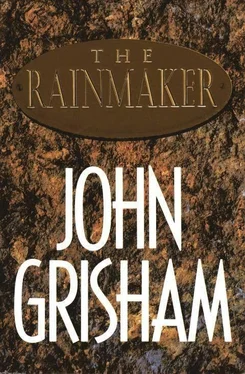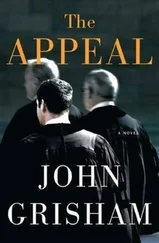Speaking of cash, I take the financial statements and explain to the jury that I’ve been studying them for four months and still don’t understand them. The industry has its own funny accounting practices. But, using the company’s own figures, there’s plenty of cash around. On the chalkboard, I add the available cash, reserves and undistributed surpluses, and tally up the figure of four hundred and seventy-five million. The admitted net worth is four hundred and fifty million.
How do you punish a company this wealthy? I ask this question, and I see gleaming eyes staring back at me. They can’t wait!
I use an example that’s been around for many years. It’s a favorite of trial lawyers, and I’ve read a dozen versions of it. It works because it’s so simple. I tell the jury that I’m just a struggling young lawyer, scratching to pay my bills, not too far removed from law school. What if I work hard and am very frugal, save my money, and two years from now I have ten thousand dollars in the bank? I worked very hard for this money and I want to protect it. And what if I do something wrong, say, lose my temper and pop somebody in the nose, breaking it? I, of course, will be required to pay the actual damages incurred by my victim, but I will also need to be punished so I won’t do it again. I have only ten thousand dollars. How much will it take to get my attention? One percent will be a hundred dollars, and that may or may not hurt me. I wouldn’t want to fork over a hundred bucks, but it wouldn’t bother me too much. What about five percent? Would a fine of five hundred dollars be enough to punish me for breaking a man’s nose? Would I suffer enough when I wrote the check? Maybe, maybe not. What about ten percent? I’ll bet that if I was forced to pay a thousand dollars, then two things would happen. Number one, I’d truly be sorry. Number two, I’d change my ways.
How do you punish Great Benefit? The same way you’d punish me or the guy next door. You look at the bank statement, decide how much money is available, and you levy a fine that will hurt, but not break. Same for a rich corporation. They’re no better than the rest of us.
I tell the jury the decision is best left to them. We’ve sued for ten million, but they’re not bound by that number. They can bring back whatever they want, and it’s not my place to suggest an amount.
I close with a smile of thanks, then I tell them that if they don’t stop Great Benefit, they could be next. A few nod and a few smile. Some look at the figures on the board.
I walk to my table. Deck is in the corner grinning from ear to ear. On the back row, Cooper Jackson gives me a thumbs-up. I sit next to Dot, and anxiously wait to see if the great Leo F. Drummond can snatch victory from defeat.
He begins with a drippy apology for his performance during jury selection, says he fears he got off on the wrong foot, and now wants to be trusted. The apologies continue as he talks about his client, one of the oldest and most respected insurance companies in America. But it made mistakes with this claim. Serious mistakes. Those dreadful denial letters were horribly insensitive and downright abusive. His client was dead wrong. But his client has over six thousand employees and it’s hard to monitor the movements of all these people, hard to check all the correspondence. No excuses, though, no denials. Mistakes were made.
He pursues this theme for a few minutes, and does a fine job of painting his client’s actions as merely accidental, certainly not deliberate. He tiptoes around the claim file, the manuals, the hidden documents, the exposed lies. The facts are a minefield for Drummond, and he wants to go in other directions.
He frankly admits that the claim should’ve been paid, all two hundred thousand dollars of it. This is a grave admission, and the jurors absorb it. He’s trying to soften them up, and it’s effective. Now, for the damage control. He’s nothing but bewildered at my suggestion that the jury should consider awarding Dot Black a percentage of Great Benefit’s net worth. It’s shocking! What good would that do? He’s admitted his client was wrong. Those responsible for this injustice have been terminated. Great Benefit has cleaned up its act.
So what will a large verdict accomplish? Nothing, absolutely nothing.
Drummond carefully eases into an argument against unjust enrichment. He has to be careful not to offend Dot, because he will also offend the jury. He states some facts about the Blacks; where they live, for how long, the house, the neighborhood, etcetera. In doing so, he portrays them as a very average, middle-class family living simple but happy lives. He’s quite generous. Norman Rockwell couldn’t paint a better picture. I can almost see the shady streets and the friendly paperboy. His setup is perfect, and the jurors are listening. He’s describing either the way they live or the way they want to live.
Why would you, the jurors, want to take money from Great Benefit and give it to the Blacks? It would upset this pleasant picture. It would bring chaos to their lives. It would make them vastly different from their neighbors and friends. In short, it would wreck them. And is anyone entitled to the kind of money that I, Rudy Baylor, am suggesting? Of course not. It’s unjust and unfair to take money from a corporation simply because the money’s available.
He walks to the chalkboard and writes the figure of $746, and tells the jury this is the monthly income for the Blacks. Next to it he writes the sum of $200,000, and multiplies it by six percent to get the figure of $12,000. He then tells the jury what he really wants, and that’s to double the Blacks’ monthly income. Wouldn’t we all like that? It’s easy. Award the Blacks the $200,000 that the transplant would’ve cost, and if they’ll invest the money in tax-free bonds at six percent, then they’ll have $1,000 a month in tax-free income. Great Benefit will even agree to do the investing for Dot and Buddy.
What a deal!
He’s done this enough to make it work. The argument is very compelling, and as I study the faces I see the jurors considering it. They study the board. It seems like such a nice compromise.
It is at this point that I hope and pray they remember Dot’s vow to give the money to the American Leukemia Society.
Drummond ends with an appeal for sanity and fairness. His voice deepens and his words get slower. He’s nothing but sincerity. Please do what is fair, he asks, and takes his seat.
Since I’m the plaintiff, I get the last word. I’ve saved ten minutes of my alloted half-hour for rebuttal, and as I walk to the jury I’m smiling. I tell them that I hope one day I’ll be able to do what Mr. Drummond has just done. I praise him as a skilled courtroom advocate, one of the best in the country. I’m such a nice kid.
I have just a couple of comments. First, Great Benefit now admits it was wrong and in effect offers two hundred thousand dollars as a peace offering. Why? Because right now they’re chewing their fingernails as they fervently pray that they get hit with nothing more than two hundred thousand. Second, did Mr. Drummond admit these mistakes and offer the money when he addressed the jury Monday morning? No, he did not. He knew everything then that he knows now, so why didn’t he tell you up front that his client was wrong? Why? Because they were hoping then that you wouldn’t learn the truth. And now that you know the truth, they’ve become downright humble.
I close by actually provoking the jury. I say, “If the best you can do is two hundred thousand dollars, then just keep it. We don’t want it. It’s for an operation that will never take place. If you don’t believe that Great Benefit’s actions deserve to be punished, then keep the two hundred thousand and we’ll all go home.” I slowly look into the eyes of each juror as I step along the box. They will not let me down.
Читать дальше












